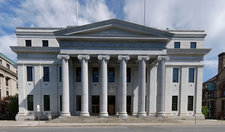State's highest court rules strip club dances aren't exempt from taxes as artistic performances
The New York Court of Appeals -- the state's highest court -- ruled today that Nite Moves, a Latham strip club, is not exempt from paying sales taxes on cover fees and private dances. Attorneys for the company that owns Nite Moves had argued the club shouldn't have to pay the taxes because dances at the club qualified for a "dramatic or musical arts performances" tax exemption.
From the 4-3 majority opinion for In the Matter of 677 New Loudon Corporation v. State of New York Tax Appeals Tribunal:
Clearly, it is not irrational for the Tax Tribunal to decline to extend a tax exemption to every act that declares itself a "dance performance." If ice shows presenting pairs ice dancing performances, with intricately choreographed dance moves precisely arranged to musical compositions, were not viewed by the Legislature as "dance" entitled a tax exemption, surely it was not irrational for the Tax Tribunal to conclude that a club presenting performances by women gyrating on a pole to music, however artistic or athletic their practiced moves are, was also not a qualifying performance entitled to exempt status. To do so would allow the exemption to swallow the general tax since many other forms of entertainment not specifically listed in the regulation will claim their performances contain tax-exempt rehearsed, planned or choreographed activity.
The majority opinion could pretty much be paraphrased as, Stop being ridiculous -- you know that is not what the law is intended to do. Judges Carmen Ciparick, Victoria Graffeo, Eugene Pigott, and Theodore Jones made up the majority.
But the dissenting opinion's response is essentially, Yeah, well, you're being a bit of a snob -- and it doesn't really matter what the legislature intended, it matters what the law actually says. And, as written, it says a dance is a dance.
As it happens, the dissent -- by Judge Robert Smith -- is more fun to read. Here's a clip:
Thus, the only question in the case is whether the admission charges that the State seeks to tax were paid for dance performances. There is not the slightest doubt that they were. That is proved by the video introduced into evidence before the Tribunal, and the testimony of two witnesses, an executive of petitioner and a dancer, with personal knowledge. The people who paid these admission charges paid to see women dancing. It does not matter if the dance was artistic or crude, boring or erotic. Under New York's Tax Law, a dance is a dance.
The majority, and the Tribunal, have implicitly defined the statutory words "choreographic . . . performance" to mean "highbrow dance" or "dance worthy of a five-syllable adjective." The admission charges for these performances are taxable because the performances are, in the majority's view, not "cultural and artistic" (majority op at 2). The Tribunal took a similar view, finding that the dancers did not put the care into their efforts that high art requires: "We question how much planning goes into attempting a dance seen on You-Tube," the Tribunal remarked. It is undisputed that the dancers worked hard to prepare their acts, and that pole dancing is actually quite difficult, but the Tribunal decided that they were not artists, but mere athletes: "The degree of difficulty is as relevant to a ranking in gymnastics as it is in dance." The Tribunal seems to have missed the point that "ranking," either of gymnasts or dancers, is not the function of a tax collector.
The majority implies that since the Legislature did not exclude from the entertainment tax other lowbrow forms of entertainment, such as baseball games and animal acts (see majority op at 2), it would not have wanted to exclude pole dancing; but the issue is not what the Legislature would have wanted to do, but what it did. If the Legislature wanted to tax all "choreographic . . . performances" except pole dancing, it could (assuming there are no constitutional problems) have said so, but the Tribunal has no authority to write that exception into the statute. And if, as the majority claims, a Department regulation purports to extend the tax to ice shows with "intricately choreographed dance moves" (majority op at 4), that is a problem with the regulation. It does not change the statute.
Chief judge Jonathan Lippman and associate judge Susan Read concurred with Smith's dissent. The ruling is embedded below.
As part of the original decision by the state Tax Tribunal, Nite Moves was on the hook for almost $130,000 in back taxes. One of the owners told the Times Union recently the total is now around $400,000.
Hi there. Comments have been closed for this item. Still have something to say? Contact us.

Comments
On the picture of the Court of Appeals -- those are considered columns, not poles. Hope that didn't confuse anybody involved in these proceedings.
... said Carl on Oct 23, 2012 at 12:05 PM | link